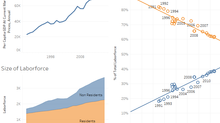Singapore in Numbers - Fertility

In this segment, we will address new insights on fertility in Singapore. Singapore's low fertility rate is well known by residents and well reported in local media. Hence, some of the highlights reported in the 2020 Singapore Population census isn't too surprising; for example:
There was a significant decreased in the average number of children born to ever-married women aged 40-49 years; from 2.02 in 2010 to 1.76 in 2020
While the average was below 2.0, 62.5% of ever married females age 40-49 years had 2 or more children
I do not doubt the accuracy of the information from the Department of Statistics; but it is probably a little confusing to the average person. To start with, the above two statements appear to be contradicting each other; how can the average number of children be 1.76 when the majority have 2 or more children? Why focus on the ever married females aged 40-49 , what about the ever married females in other age groups? What happened to Singapore's fertility between the last 10 years?

The data visualization on the right may shed more light and address some or all of the above concerns. Some key observations from the chart on the left:
Ever married females of ALL ages appear to be having fewer children over the last 40 years
The most significant drop has been by ever married females aged 40-49 between 1980-1990
But ever married females across these ages represent different generations
While ever married females age 40-49 may have 1.76 children on average; it is unclear if those aged 30-39 would follow the same trend
62.5% of ever married females aged 40-49 have 2 or more children
24% have had only 1 child and 13.5% do not have any children
More are choosing to have no children; from 2% in 1980 to 13.5% in 2020 for those aged 40-49
While most married couples are having enough children to replace themselves, how then is Singapore a rapidly ageing society? In order to understand this, one must refer to some of the findings from FYTs previous segments in the series. Singapore's ageing population is due to a combination of factors:
While married couples are probably replacing themselves through their children;
There is an increasing trend of residents choosing to remain single
Of those that choose to marry, they are doing so later in life which probably impacts the timeframe to have children and hence the number of children they eventually have
Singapore has one of the longest life expectancies in the world
This is a testament to Singapore's progress as a nation and for Singapore's healthcare system
But with longer life expectancies and fewer children, the old age dependency will start to increase and eventually strain many aspects of life in Singapore (healthcare system, retirement adequacy, housing etc.
Data further suggest that the Chinese ethnic group is likely to see the effects much earlier than the others
For more information, you may refer to FYTs interactive dashboards as well as previous blogs

























Comments